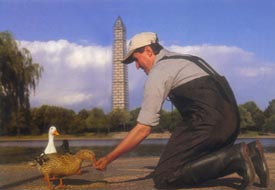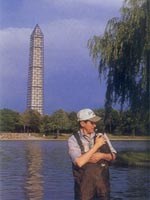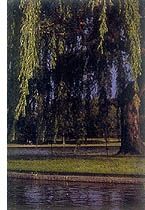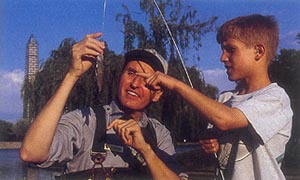

When one of the ducks living in the Lake at
Constitution Gardens needs help, Ted Woynicz is the man to call.
 |
Ted's ducks live within a waddle
of the Washington Monument and the Reflecting Pool |
 long a busy stretch of
Constitution Avenue,
across from the Federal Reserve building,
Ted Woynicz leads a visitor to his special place. long a busy stretch of
Constitution Avenue,
across from the Federal Reserve building,
Ted Woynicz leads a visitor to his special place.
It's informally dubbed "The Lake at Constitution Gardens,"
a 7.5-acre, island-dotted jewel flanked by the Washington Monument and the Reflecting Pool.
But Ted has another, even more casual, moniker for the lake.
"Welcome to the land of the ducks," he says.
Known to his cohorts as "Ted the Duckman," the Florida native
is one of more than 200 greater Washingtonians who serve as National Park Service
VIPs - Volunteers in the Park. They are typically volunteers who lend a particular
professional or personal expertise or skills to their duties.
And for most of his life, Ted has been interested in ducks.
Raised on a 1,000-acre farm at the edge of the Florida Everglades, Ted grew up around
3,000 head of cattle, 200 horses, dozens of dogs and cats-and hundreds of ducks.
He started as a zoology major at the University of Florida in the late 1970s, before
graduating with a degree in visual design. He later earned a professional certificate
in neurolinguistic programming from the society of NLP while attending George Washington
University.
Ted has served as VIP at the lake for nearly six years. And although
he's officially a volunteer, he comes to the park most every day. In a year, he'll log
700 hours at the lake, or nearly five times beyond volunteer minimum.
So park officials consider Ted the steward of the lake. He's the one to alert them when ducks
lay eggs, and when they hatch. He gives the heads-up when the algae is getting bad.
"He's our eyes and ears out there for so many things," says Gregg Kneipp, a natural resource
management specialist at Parks Central. "So he lets us know when he sees something that
needs attention, and he often sees it well ahead of us."
Today, wearing his park uniform, Ted slowly circles the edge of the lake. Walking along the
4,200 feet of shoreline, he finds bits of discarded Americana - potato chip bags, soda cans,
hundreds of feet of fishing line, house keys, watches, cameras, running shoes, even a rusted
tricycle.
He picks up every piece and disposes of it properly.
These items have no place in their home, he says ("them" being the ducks, of course).
Hundreds of human visitors come uninvited and leave such trash, but Ted is
too civil to be impolite.
|
Volunteer Ted "the Duckman" Woynicz spends more than 700 hours a
year watching over the waterfowl living at the lake at Constitution Gardens in
Washington, D.C. |


|
It's not that people dislike the ducks, he explains. Most
love to see them here, a reminder of childlike playfulness in the middle of urban
Washington D.C. These city dwellers leave trash behind because they don't know
any better. Which is why Ted the Duckman keeps coming.
A few minutes later, Ted spots a pair of men whose border collies are running without
leashes. Not that he has anything against dogs either, but they have their place, and
a park filled with ducks isn't the place for unrestrained dogs.
"Gentlemen," Ted says, pointing out his park name tag.
"You'll have to put those dogs on a leash. It's the law. Thank you kindly."
In addition to knowing the law, Ted also calls most of the
ducks by name, and there have been more than 50 named during his years of volunteering.
When I bring my friends here at night,
I can tell from the sound of the quack who the duck is. It's like when you spot
your wife coming out of a crowd at RFK Stadium. It's instant recognition.
Ted Woynicz
"There's Dover, his feathers look like the white cliffs of
Dover," he says. A duck named Mousse has a cappuccino-chocolate look. "There's
Wrinklebeak, a unique snowy mallard, who has a wrinkled beak, and Sabrina, a mallard
hen, who has a smoky gypsy look."
Another lake visitor watches Ted interact with his flock.
"You have names for all the ducks?" He asks.
Yes, of course, Ted tells the visitor.
He does.
"That's alllll-right!" the visitor replies, smiling.
"For me it's easy to recognize the individual ducks," Ted says. It comes from
being around them for thousands of hours," he explains. "When I bring my friends here at night, I can tell from the sound of the quack who
the duck is. It's like when you spot your wife coming out of a crowd at RFK
Stadium. It's instant recognition." The brain can detect consistent patterns. I can
detect the same [such as shapes, quacks, plumage] from these ducks."
Ted points out
O , a very special duck indeed.
He found an egg unhatched amid a nest where 12 ducklings had just been born. He knew
that late ducklings, "those taking more than 24 hours to hatch after the first duckling
hatches," are often left behind. , a very special duck indeed.
He found an egg unhatched amid a nest where 12 ducklings had just been born. He knew
that late ducklings, "those taking more than 24 hours to hatch after the first duckling
hatches," are often left behind. |

|
He's our eyes and ears out there
for so many things. So he lets us know when he sees something that needs
attention, and he often sees it well ahead of us.
Gregg Kneipp, Natural Resource Management Specialist,
Washington D.C. Parks - Central
 n executive support
consultant in his other life, Ted had just
finished a meeting with a client one day before heading out to the lake. Still
wearing his suit and tie, he was walking along the water's edge when he discovered
the egg with a little beak sticking out of a small hole and heard two weak cheeping
sounds. n executive support
consultant in his other life, Ted had just
finished a meeting with a client one day before heading out to the lake. Still
wearing his suit and tie, he was walking along the water's edge when he discovered
the egg with a little beak sticking out of a small hole and heard two weak cheeping
sounds.
The egg was very cold, so Ted did the only thing the Duckman
could do. He took the egg home, wrapped it up with towels, lay it on his chest,
put a heatlamp overhead, and hatched it himself. It took 16 hours.
"When she hatched, I was so glad to see that her breathing
normalized that I named her O ,"
Ted explains, "Like oxygen." ,"
Ted explains, "Like oxygen."
Lucky O is now 4 years old. She has hatched 63 ducklings of her own. But she and her brood still
endure the occasional thoughtlessness of visitors. Once Ted had to rush her brother,
Dolphin to a wildlife rehab center because he had swallowed two fish hooks and had
another stuck through his ankle. It took a month for him to heal enough to return to
the lake.
is now 4 years old. She has hatched 63 ducklings of her own. But she and her brood still
endure the occasional thoughtlessness of visitors. Once Ted had to rush her brother,
Dolphin to a wildlife rehab center because he had swallowed two fish hooks and had
another stuck through his ankle. It took a month for him to heal enough to return to
the lake.
Getting Dolphin back to the lake was important. Ted never
separates a family. And they are families, he stresses.
"Most people think animals don't remember. But in reality
they don't forget their bonds," he says. "I brought Dolphin back after a month.
When I took him out of the carrier and put him in the water, you should have
seen his brothers and sisters flapping around in the water. They were so happy to
see each other again, to be together again as a family.
Ted points to two ducks quacking in the distance.
"There's Toby Duck and Amadeus," he says. "Come here, guys. Come here."
And they do, flocking to Ted like children rushing to
greet their father.
 |
When he's not caring for the Garden's fowl
residents, Ted helps its human visitors |
Article: Dennis McCafferty
Photographs: Allen Rokach
Southern Living Magazine, March 2000
|
DOING LIKE THE DUCKMAN |
|
For more information on the
Volunteer in the Park Program, contact National Capital Parks - Central,
900 Ohio Drive SW, Washington, D.C. 20024 (202) 426-6841 |
|
 |